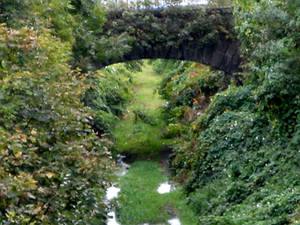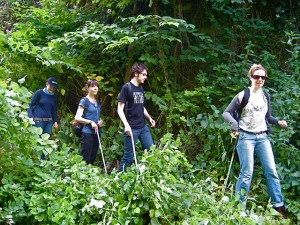About The Lifeline Project
 The Lifeline Project is a community led campaign promoting the integrated use of urban resources (people, places, materials, systems) to achieve enhanced efficiencies and well-being. The inquiry focuses on the disused Midland Great Western Railway cutting which links Broadstone to Broombridge in northwest inner city Dublin, as a living laboratory for sustainable development. Project interests include sustainable food system planning, urban biodiversity, eco-tourism, green transport and innovative models of health-care, recreation, and waste management.
The Lifeline Project is a community led campaign promoting the integrated use of urban resources (people, places, materials, systems) to achieve enhanced efficiencies and well-being. The inquiry focuses on the disused Midland Great Western Railway cutting which links Broadstone to Broombridge in northwest inner city Dublin, as a living laboratory for sustainable development. Project interests include sustainable food system planning, urban biodiversity, eco-tourism, green transport and innovative models of health-care, recreation, and waste management.
The Lifeline Project is process driven and has 3 key objectives:
- Expand civil capacity through collaborative community based action research that explores local context, culture and heritage and the proactive use EU environmental policy.
- Develop citizen lead demonstration projects, practical, relevant, and of immediate value to Dublin and other European cities.
- Establish a foundation to support interdisciplinary health-care design and community based participative research focused on behavioural economics, public health and the impact of environmental design on quality of life.
In 2009 the LIFELINE entered into partnership with Dublin Institute of Technology (DIT) who support project objectives by providing research under the Students Learning With Communities Program. This relationship has introduced ‘Service Learning’ and new rigor to the project. A diverse range of disciplines participate in LIFELINE research including Architecture, Spatial Planning, Sustainable Development, Nutrition, Nutiriceuticals and Chemistry. See examples of research carried out in collaboration with the DIT can be found on their Students Learning with Communities Lifeine Project Page.
In 2010 the Lifeline Project began experimenting with product development to raise funds to support the ongoing development of its research, develop awareness of the project and communicate it’s ethos and themes. The first product, LifeLine Soap, hand made in Stoneybatter, Dublin 7, demonstrates the concept of industrial ecology and contains over 50% premium quality waste ingredients sourced locally.
 Desireland
Desireland
